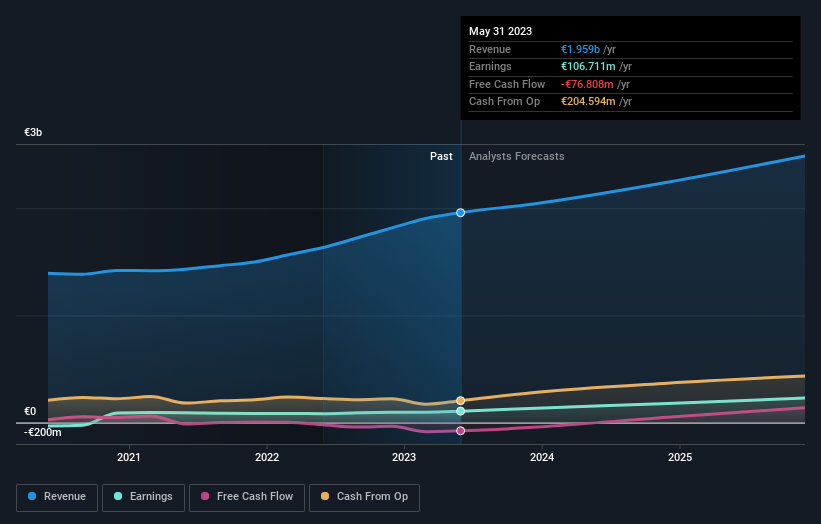Stock Analysis
- Germany
- /
- Life Sciences
- /
- XTRA:GXI
Gerresheimer AG's (ETR:GXI) institutional investors lost 13% last week but have benefitted from longer-term gains

Key Insights
- Significantly high institutional ownership implies Gerresheimer's stock price is sensitive to their trading actions
- 52% of the business is held by the top 12 shareholders
- Using data from analyst forecasts alongside ownership research, one can better assess the future performance of a company
To get a sense of who is truly in control of Gerresheimer AG (ETR:GXI), it is important to understand the ownership structure of the business. The group holding the most number of shares in the company, around 88% to be precise, is institutions. In other words, the group stands to gain the most (or lose the most) from their investment into the company.
No shareholder likes losing money on their investments, especially institutional investors who saw their holdings drop 13% in value last week. However, the 102% one-year return to shareholders may have helped lessen their pain. But they would probably be wary of future losses.
In the chart below, we zoom in on the different ownership groups of Gerresheimer.
Check out our latest analysis for Gerresheimer

What Does The Institutional Ownership Tell Us About Gerresheimer?
Institutional investors commonly compare their own returns to the returns of a commonly followed index. So they generally do consider buying larger companies that are included in the relevant benchmark index.
We can see that Gerresheimer does have institutional investors; and they hold a good portion of the company's stock. This implies the analysts working for those institutions have looked at the stock and they like it. But just like anyone else, they could be wrong. If multiple institutions change their view on a stock at the same time, you could see the share price drop fast. It's therefore worth looking at Gerresheimer's earnings history below. Of course, the future is what really matters.

Since institutional investors own more than half the issued stock, the board will likely have to pay attention to their preferences. Gerresheimer is not owned by hedge funds. Looking at our data, we can see that the largest shareholder is Goldman Sachs Group, Investment Banking and Securities Investments with 9.7% of shares outstanding. For context, the second largest shareholder holds about 9.0% of the shares outstanding, followed by an ownership of 5.1% by the third-largest shareholder.
Looking at the shareholder registry, we can see that 52% of the ownership is controlled by the top 12 shareholders, meaning that no single shareholder has a majority interest in the ownership.
While it makes sense to study institutional ownership data for a company, it also makes sense to study analyst sentiments to know which way the wind is blowing. There are plenty of analysts covering the stock, so it might be worth seeing what they are forecasting, too.
Insider Ownership Of Gerresheimer
The definition of an insider can differ slightly between different countries, but members of the board of directors always count. Management ultimately answers to the board. However, it is not uncommon for managers to be executive board members, especially if they are a founder or the CEO.
Most consider insider ownership a positive because it can indicate the board is well aligned with other shareholders. However, on some occasions too much power is concentrated within this group.
Our data cannot confirm that board members are holding shares personally. It is unusual not to have at least some personal holdings by board members, so our data might be flawed. A good next step would be to check how much the CEO is paid.
General Public Ownership
With a 12% ownership, the general public, mostly comprising of individual investors, have some degree of sway over Gerresheimer. While this group can't necessarily call the shots, it can certainly have a real influence on how the company is run.
Next Steps:
It's always worth thinking about the different groups who own shares in a company. But to understand Gerresheimer better, we need to consider many other factors. Like risks, for instance. Every company has them, and we've spotted 2 warning signs for Gerresheimer (of which 1 is significant!) you should know about.
If you are like me, you may want to think about whether this company will grow or shrink. Luckily, you can check this free report showing analyst forecasts for its future.
NB: Figures in this article are calculated using data from the last twelve months, which refer to the 12-month period ending on the last date of the month the financial statement is dated. This may not be consistent with full year annual report figures.
Valuation is complex, but we're helping make it simple.
Find out whether Gerresheimer is potentially over or undervalued by checking out our comprehensive analysis, which includes fair value estimates, risks and warnings, dividends, insider transactions and financial health.
View the Free AnalysisHave feedback on this article? Concerned about the content? Get in touch with us directly. Alternatively, email editorial-team (at) simplywallst.com.
This article by Simply Wall St is general in nature. We provide commentary based on historical data and analyst forecasts only using an unbiased methodology and our articles are not intended to be financial advice. It does not constitute a recommendation to buy or sell any stock, and does not take account of your objectives, or your financial situation. We aim to bring you long-term focused analysis driven by fundamental data. Note that our analysis may not factor in the latest price-sensitive company announcements or qualitative material. Simply Wall St has no position in any stocks mentioned.
About XTRA:GXI
Gerresheimer
Gerresheimer AG, together with its subsidiaries, manufactures and sells medicine packaging, drug delivery devices, and solutions in Germany and internationally.
Good value with reasonable growth potential.

